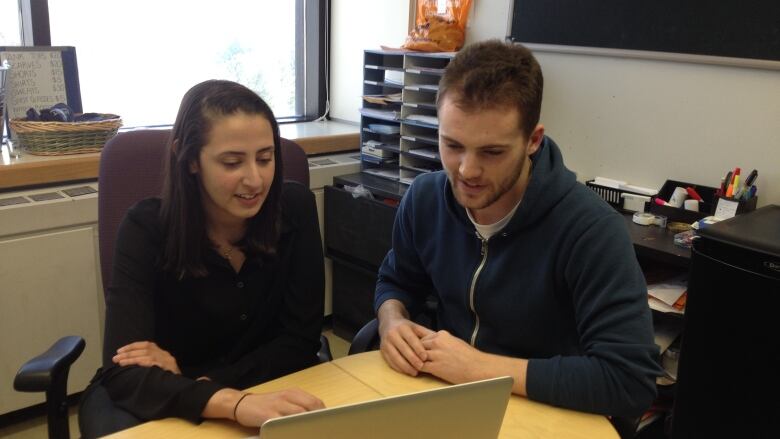Youth unemployment in Ottawa a tale of two job hunts
Unemployment rate for 15-24 year olds sits at 13.3 per cent in the capital region

Young people in Ottawa continue to have a tougher time finding a job than any other age group, and the search has only become tougher since the recession. But, some say, jobs for new graduates are still out there.
Josh Jakubczak expected it might take three to six months to find a job after graduating from university. But those markers have come and gone, and he still spends every day at his parents' house, trolling job postings.
Norine AwadAllah, meanwhile, is sailing through her last semester of an undergraduate degree, knowing she will walk into a well-paying accounting job at an Ottawa firm come September.
- IN DEPTH |Who's winning or losing in Ottawa's job market?
- AUDIO | Looking for work later in your career
Both belong to Ottawa-Gatineau's youth employment demographic. The unemployment rate for people aged 15-24 has always been much higher than that of adults, often about double.
Since the global financial crisis of 2008, the job situation for youth has worsened. Unemployment has jumped 3.7 percentage points to 13.3% in 2013, although it's still slightly better than the national rate, and much better than the Ontario one. At the same time, the number of youth with jobs has fallen by more than 20,000 young people since 2008, while the overall population aged 15-24 in the capital region dropped only 10,000, according to Statistics Canada data.
Tough job market for youth
Jakubczak, 23, has the unfortunate position of belonging to one of the worst off groups, statistically, in the Canadian job market: young, white and male.
At first he felt things looked promising for him. Jakubczak received his degree from the University of Waterloo last spring, after studying business and social sciences. He had done two co-op placements with the federal government and another with a law firm.

"You're told it's a tough job market," said Jakubczak. "But you can never really understand how tough it is until you start pounding the pavement or I guess a better term now is pounding the keyboard trying to find a job and make things work."
He feels the reason the market is so difficult is that the university degree has become so common, and he's competing with a large pool of equally qualified candidates.
Jakubczak, who moved back home to Ottawa to save money, feels a constant sense of pressure. He stays awake at night wondering what he could change about his job search methods, and how to avoid failure.
"What happens if I can't find something? How long is this going to continue, day in day out doing this groundhog day sort of routine? I don't want to be the guy who lives at home, who's a lot older than he should be. I want to get on with my life, I want to be able to start a career, start a family at some point, really launch myself into adulthood."
Some students successful in job hunt
Norine AwadAllah, 20, meanwhile, sits relaxed in a student society officeat Carleton University's Sprott School of Business. She still cares about her grades in her final term of university, but is glad not to have the stress of looking for an accounting job. A co-op term earlier in her degree has led to an offer of full-time employment come September.
Even as a child, AwadAllah's favourite toy was a little red cash register that had fake bills and coins, and a tape for her to tally numbers. But her career choice was sealed in high school, when a speaker came to her class and described the field and the path to a chartered accounting designation.
"He basically bribed us with looking at what the salaries would be like so I was like, 'I want that. I want that salary,'" said AwadAllah, "But he actually spoke about how his life was planned basically right after university and that appealed to me a lot.

Work Shift Series on CBC Ottawa
Watch:
CBC News Ottawa at 6 on CBC Television
Listen:
Ottawa Morning, weekdays 5:30 - 8:30 a.m., 91.5 FM
All in a Day, weekdays 3 - 6 p.m., 91.5 FM
I just like knowing exactly where I'll be in a year, or two, or five. That's just how I am."
AwadAllah says a number of fellow students in accounting also nailed down jobs while still studying, and she thinks it's partly because accounting is a field where the route to a job is similar for everyone. Also, she finds firms need young accountants, and come to recruit them.
Yet, she finds her friends in finance and marketing also had success when they took advantage of networking and career workshops offered by their business school.
Her friend, Mitch Brown, agrees. He too has an accounting job that begins shortly after graduation. Watching friends in other disciplines struggle, he thinks a lot comes down to students planning the big picture in one's university years.
"There are jobs there, but I think students aren't proactive enough in looking for them, and really getting out there networking and finding the jobs," said Brown, who admits that networking works best when seeking a job in the private sector. "I feel like a lot of people have other priorities. They get into university. They want to have fun. Yeah they want to do well in school, but they're not really thinking... 'Where do I see myself in 10 years?' or 'Where do I see myself right when I'm done school?'"
Job fair recruiting new grads
Meanwhile, downstairs at Carleton University, young people are meeting potential employers face-to-face at a career fair for new graduates and alumni.
Students buzz among some 30 booths, including Cisco, which recently signed a deal with the Ontario government to create up to 1700 jobs,and Shopify, which is recruiting since receiving an influx of $100 million of venture capital. Despite cutbacks in the public sector, some government employers are also on hand, including Canada Revenue Agency, the Canadian Security Intelligence Service, and Canadian Forces.

"So, there's definitely a lot of students looking for work," said Mxi IT services consultant Ardy Golshani, who also has advice for young job seekers.
"What I would suggest to students is apply anyway. Don't wait for a posting." Golshani said Mxi Technologies often ends up with new projects and will dip into its pool of resums looking for candidates.
When it comes to a new graduate's job search, at this fair, much seems to depend on a student's area of study. Many employers are recruiting new graduates with computer science and engineering backgrounds. A management consulting firm, A Hundred Answers, however, is looking for students of all disciplines, if they have the right personality.
That's why the university is set on encouraging students to do everything possible to prepare.
"Even when the job market is really really strong, it's still competitive," said Kerry Eamer, director of Carleton's career services office. "Everybody still wants 'the cream of the crop', 'the best' and it's all about learning to package yourself properly."
On mobile?Click here to vote on if you've had difficulty finding a job in Ottawa since the recession.












_(720p).jpg)


 OFFICIAL HD MUSIC VIDEO.jpg)
.jpg)



























































































